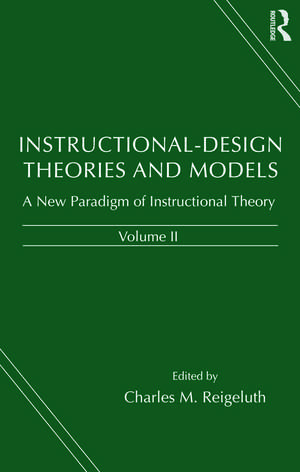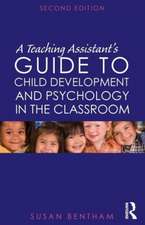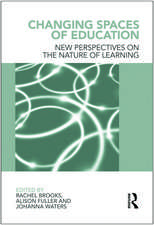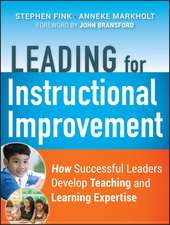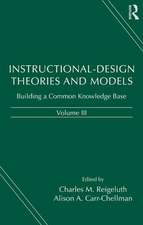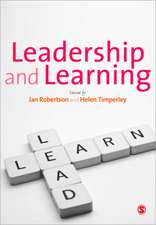Instructional-design Theories and Models: A New Paradigm of Instructional Theory, Volume II
Editat de Charles M. Reigeluthen Limba Engleză Hardback – apr 1999
This volume provides a concise summary of a broad sampling of new methods of instruction currently under development, helps show the interrelationships among these diverse theories, and highlights current issues and trends in instructional design. It is a sequel to Instructional-Design Theories and Models: An Overview of Their Current Status, which provided a "snapshot in time" of the status of instructional theory in the early 1980s. Dramatic changes in the nature of instructional theory have occurred since then, partly in response to advances in knowledge about the human brain and learning theory, partly due to shifts in educational philosophies and beliefs, and partly in response to advances in information technologies. These changes have made new methods of instruction not only possible, but also necessary in order to take advantage of new instructional capabilities offered by the new technologies. These changes are so dramatic that many argue they constitute a new paradigm of instruction, which requires a new paradigm of instructional theory.
In short, there is a clear need for this Volume II of Instructional Design Theories and Models. To attain the broad sampling of methods and theories it presents, and to make this book more useful for practitioners as well as graduate students interested in education and training, this volume contains twice as many chapters, but each half as long as the ones in Volume I, and the descriptions are generally less technical. Several unique features are provided by the editor to help readers understand and compare the theories in this book:
*Chapter 1, which discusses the characteristics of instructional theory and the nature of the new paradigm of instruction, helps the reader identify commonalities across the theories.
*Chapter forewords, which summarize the major elements of the instructional-design theories, are useful for reviewing and comparing theories, as well as for previewing a theory to decide if it is of interest, and for developing a general schema that will make it easier to understand.
*Editor's notes provide additional help in understanding and comparing the theories and the new paradigm of instruction to which they belong.
*Units 2 and 4 have introductory chapters to help readers analyze and understand the theories in those units.
This is an essential book for anyone interested in exploring new approaches to fostering human learning and development and thinking creatively about ways to best meet the needs of learners in all kinds of learning contexts.
Readers are invited to use Dr. Charles Reigeluth's Web site to comment and to view others' comments about the instructional design theories in this book, as well as other theories. Point your browser to: www.indiana.edu/~idtheory
Preț: 1028.70 lei
Preț vechi: 1254.51 lei
-18% Nou
Puncte Express: 1543
Preț estimativ în valută:
196.85€ • 210.49$ • 164.12£
196.85€ • 210.49$ • 164.12£
Carte tipărită la comandă
Livrare economică 17 aprilie-01 mai
Preluare comenzi: 021 569.72.76
Specificații
ISBN-13: 9780805828597
ISBN-10: 0805828591
Pagini: 728
Ilustrații: Illustrations
Dimensiuni: 152 x 229 x 51 mm
Greutate: 1.27 kg
Ediția:New.
Editura: Taylor & Francis
Colecția Routledge
Locul publicării:Oxford, United Kingdom
ISBN-10: 0805828591
Pagini: 728
Ilustrații: Illustrations
Dimensiuni: 152 x 229 x 51 mm
Greutate: 1.27 kg
Ediția:New.
Editura: Taylor & Francis
Colecția Routledge
Locul publicării:Oxford, United Kingdom
Public țintă
ProfessionalCuprins
Contents: Part I:About Instructional-Design Theory. C.M. Reigeluth, What Is Instructional-Design Theory and How Is It Changing? G.E. Snelbecker, Some Thoughts About Theories, Perfection, and Instruction. Part II:Fostering Cognitive Development. C.M. Reigeluth, J. Moore, Cognitive Education and the Cognitive Domain. H.E. Gardner, Multiple Approaches to Understanding. D.N. Perkins, C. Unger, Teaching and Learning for Understanding. M. Hannafin, S. Land, K. Oliver, Open Learning Environments: Foundations, Methods, and Models. R.H. Mayer, Designing Instruction for Constructivist Learning. R.C. Schank, T.R. Berman, K.A. Macpherson, Learning by Doing. D. Schwartz, X. Lin, S. Brophy, J.D. Bransford, Toward the Development of Flexibly Adaptive Instructional Designs. D. Jonassen, Designing Constructivist Learning Environments. L.M. Nelson, Collaborative Problem Solving. K. Bielaczyc, A. Collins, Learning Communities in Classrooms: A Reconceptualization of Educational Practice. L. Corno, J. Randi, A Design Theory for Classroom Instruction in Self-Regulated Learning? S. Pogrow, Systematically Using Powerful Learning Environments to Accelerate the Learning of Disadvantaged Students in Grades 4-8. L.N. Landa, Landamatics Instructional-Design Theory for Teaching General Methods of Thinking. S.J. Kovalik, J.R. McGeehan, Integrated Thematic Instruction: From Brain Research to Application. M.D. Merrill, Instructional Transaction Theory (ITT): Instructional Design Based on Knowledge Objects. C.M. Reigeluth, The Elaboration Theory: Guidance for Scope and Sequence Decisions. Part III:Fostering Psychomotor Development. A. Romiszowski, The Development of Physical Skills: Instruction in the Psychomotor Domain. Part IV:Fostering Affective Development. B.L. Martin, C.M. Reigeluth, Affective Education and the Affective Domain: Implications for Instructional-Design Theories and Models. C. Lewis, M. Watson, E. Schaps, Recapturing Education's Full Mission: Educating for Social, Ethical, and Intellectual Development. K. Stone-McCown, A.H. McCormick, Self-Science: Emotional Intelligence for Children. T.F. Kamradt, E.J. Kamradt, Structured Design for Attitudinal Instruction. T. Lickona, Character Education: The Cultivation of Virtue. J. Moore, Adolescent Spiritual Development: Stages and Strategies. Part V:Reflections and Future Research. C.M. Reigeluth, T.W. Frick, Formative Research: A Methodology for Creating and Improving Design Theories. G.E. Snelbecker, Current Progress, Historical Perspective, and Some Tasks for the Future of Instructional Theory.
Recenzii
"Overall, the volume fulfills a number of important functions and provides a positive direction for moving ahead with efforts to instantiate learning environments that reflect modern views of learning and social, affective development. It brings together an impressive array of theorists focused on issues of instructional-design for fostering cognitive, physical, and affective areas of education and training."
—Contemporary Psychology
—Contemporary Psychology
Notă biografică
Charles M. Reigeluth (Indiana University, USA)
Descriere
This second edition focuses on the new generations of instructional theories and models. The theme of this volume is diversity, it includes the role of values and different kinds of learning, and how they influence instructional theory and design.
